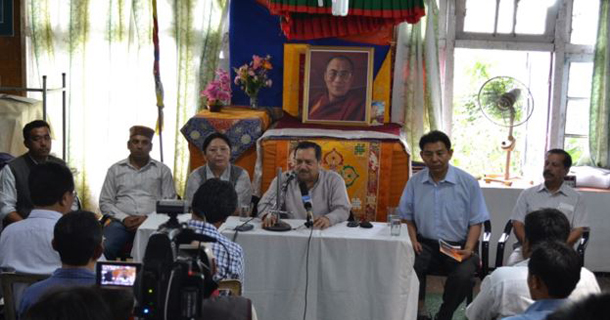
RSS Leader Indresh Kumar pledged more
support to Tibet on his visit to the CTA
Photo: Tenzin Sangmo/VoA
Recent commentary from a number of senior Indian officials has indicated that the political climate in New Delhi is warming to increased support for Tibet. In the wake of the Tibet-friendly Bharatiya Janata Party’s (BJP) election victories in May especially, Indian leaders are becoming increasingly vocal regarding their concern for the rights of Tibetans in Tibet.
Evidence of mounting government support came most recently during a one-day conference on the 1913 Shimla Convention on July 3 in New Delhi. During the conference, former Special Director of India’s Intelligence Bureau RN Ravi made his support for Tibet clear, stating “India-China friendship is not possible without resolution of the Tibet issue, guaranteeing satisfaction and dignity of its people [Tibetans].” The conference also saw Senior BJP leader Murli Manohar Joshi affirm his support for the Tibetan people and decry what he described as China’s use of “violent means to change Tibet’s demography” – a reference to China’s intensive efforts to resettle millions of Han immigrants in Tibet in the last decade.
These statements closely follow a June 30 pledge of “all co-operation and support” from Indresh Kumar, a senior leader in the BJP parent organisation the Rashtriya Swayamsevak Sangh (RSS). Still others, like former Chairman of India’s Joint Intelligence Committee SD Pradhan, have committed themselves to the advocacy of Tibetan interests.
The sweeping general election victories achieved by Prime Minister Narendra Modi and the historically Tibet-friendly BJP have further revealed a growing body of government support for the Tibetan cause. Already, the Prime Minister has demonstrated a heightened sensitivity to the Tibetan cause, inviting Sikyong of the CTA to his swearing-in ceremony and appointing Dr Ajit Kumar Doval and VK Singh, both outspoken supporters of Tibet, to influential State offices. As a result, speculation that the Modi Administration may be more open to advocacy of Tibetan interests and to a reconsideration of India’s Tibet policy has flourished. The general election also resulted in victories for greater numbers of Tibet-friendly candidates including, among others, Thupten Tshewang of Ladakh, Kiran Rijuji from Arunachal Pradesh, Shanta Kumar from Himachal Pradesh, and Dr Harsh Vardhan from Delhi.
Tibet may be finding greater support within India’s political leadership, but the question remains: do the supporters of Tibet in India’s legislature and the Modi Administration have the political will to translate promises of support into meaningful action? In the face of intensifying economic ties between India and China, a substantive pro-Tibet development in India’s Tibet policy is far from certain. As Indian supporters of Tibet have argued, India stands to gain much in the arenas of security and national integrity by developing a firmer Tibet policy; however, only the coming months and years will determine whether the nation’s leadership makes a similar calculation and acts upon it.




 Print
Print Email
Email